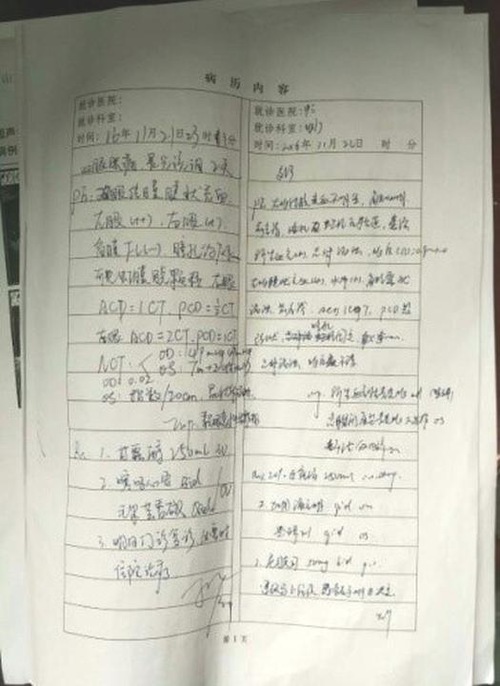(Minghui.org) A Guangzhou City resident became blind in her right eye after just 19 days of detention. The local trial court dismissed her case against the responsible party and refused to forward her appeal to the local appeals court as required by law. She has now filed a complaint against the trial court and directly mailed her appeal to the higher court.
Ms. Wu Yangzhen, a 73-year-old retiree of Guangdong Province Institute of Metrology, was targeted because she refused to renounce Falun Gong, a spiritual discipline being persecuted by the Chinese communist regime.
Arrested by Non Government Community Committee
Staff from Linhe Street’s Xinshequ Community Committee forcibly removed Ms. Wu from her home on November 2, 2016 and sent her to a local brainwashing center, an extra-legal facility used to detain Falun Gong practitioners.
In China, community committees are designed to be voluntary non-government organizations, but they are actually controlled by the committees’ local governments. Such committees are tasked with monitoring their local Falun Gong practitioners under the persecution policy. Though they have no legal authority to arrest people, they often work with police in detaining Falun Gong practitioners.
Ms. Wu was abused and tortured while in detention. By the time she was released on November 21, 2016, she had gone totally blind in her right eye, and the vision in her left eye was severely impaired.
Her family brought her to Sun Yat-sen University’s Eye Center hours after her release. They made a few more visits to the eye center during the next few days. The doctors recommended immediate hospitalization. Her condition, however, didn’t improve.

 Ms. Wu’s diagnosis and medical records
Ms. Wu’s diagnosis and medical records
Complaint Against Linhe Street Dismissed
Ms. Wu filed a criminal complaint in June 2017 against Linhe Street for violating her personal freedom. The local Guangzhou City Railroad Transportation First Court registered her case on June 22.
Included in the complaint was three key pieces of evidence: her diagnosis and medical records, a recording of the phone conversation between Ms. Wu’s family and Huang Xiaolan (director of Linhe Street’s Xinshequ Community Committee), and a photo taken on the day of Ms. Wu’s release that shows who sent her home.
While Ms. Wu was still detained, her family called Huang to inquire when she’d be released. Huang said that it was up to her supervisors to decide on a release date.
Several people, including Huang, drove Ms. Wu home when she was released from the brainwashing center.
 Photo taken on the day of Ms. Wu’s release: Ms. Wu was sitting on the right; second from right is Huang Xiaolan; the rest were staff from the brainwashing center
Photo taken on the day of Ms. Wu’s release: Ms. Wu was sitting on the right; second from right is Huang Xiaolan; the rest were staff from the brainwashing center
Ms. Wu and her lawyer argued that the phone conversation and the photo were clear evidence that the local community committee was involved in her arrest and detention. As such, Ms. Wu had every right to hold its supervising agency, Linhe Street, responsible for her detention and subsequent eye injury.
Presiding Judge Huang Zheng and his assistant judges, He Guomei and Liang Minqin, ruled on July 17 to dismiss the case, claiming that the plaintiff failed to provide evidence showing the defendant’s involvement in the plaintiff’s arrest.
Appeal Twice Rejected by Trial Court
There are two ways to file appeals in China. One is to submit appeal documents to a trial court, which is then obligated to forward the files to a corresponding appeals court. The alternative is for the plaintiff to directly submit the documents to an appeals court.
Ms. Wu decided to submit her appeal to Guangzhou City Railroad Transportation Intermediate Court via the local trial court.
She used EMS to mail her documents to the trial court on July 26. She soon received a confirmation showing that her mail was being processed.
Strangely, she received another EMS confirmation on August 8, even though she only tried to mail her document once.
Ms. Wu heard nothing from the trial court or the appeals court in the next few months. She grew wary of what could have happened and checked the EMS tracking records online.
She realized that the trial court had refused to accept her appeal when the document was delivered to it. Her local postal office tried again on August 8, which explained the second EMS confirmation, but still the trial court declined to accept her appeal.
The tracking records showed that her postal office tried a third time, and the trial court eventually accepted the document in late August.
Judge Huang, however, didn’t forward Ms. Wu’s appeal to the higher court as required by law.
Complaint Filed Against Trial Court Judges
Ms. Wu decided to mail her appeal directly to the appeals court. She also filed a complaint against judge Huang and his assistants He Guomei and Liang Minqin for refusing to forward her appeal.
Ms. Wu mailed her appeal and complaint to the following agencies: Guangzhou City Railroad Transportation Intermediate Court, Guangzhou City Intermediate Court, and Guangzhou City Railroad Transportation Procuratorate.
Related Report: 72-Year-Old Woman Loses Eyesight After Torture at Brainwashing Center











